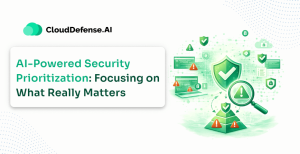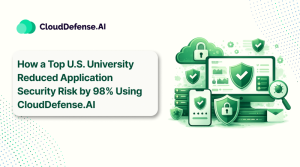We are well aware of the surface web, where most of us surf the internet. In fact, you are reading this article on it. However, you might have come across the terms Deep web and Dark web as well – two distinct concepts but often mistakenly thought to be identical.
Yes, the dark web is indeed a part of the deep web, but it is not the other way around. The deep web, in turn, is anything on the internet that regular search engines haven’t indexed. We certainly use the deep web whenever we access websites that require a password to log in or even when we try to check the contents of our email.
To view the dark web, you need a special browser that allows you to surf the hidden networks it is built upon. A good read through this article will help you clear all misconceptions you might have on Deep Web vs Dark Web through an in-depth analysis of each concept.
Understanding Deep Web:
Anything that you can’t access through generic search engines.
What is the Deep Web?
The deep web refers to the unindexed portion of the internet not accessible through traditional search engines, such as Bing, Yahoo!, and Google. It includes private databases, academic resources, and other content not meant for the public to view.
Not completely illegal, the deep web has some contrasts with the dark web— which is a subset that requires special tools to access it and is associated with illegal activities.
Applications of Deep Web
The deep web has various applications primarily focused on privacy, security, and specialized access to information. Secure communication tools, such as encrypted email services and private messaging platforms, often operate on the deep web, providing users with enhanced confidentiality. Moreover, academic databases, proprietary business networks, and confidential research databases are part of the deep web.
Privacy-focused services, like anonymous browsing and secure file storage, also use the deep web. Individuals may use the deep web to bypass censorship and communicate freely in regions with restricted internet access. It also serves as a platform for whistleblowers and activists to share information without fear of punishment.
While the deep web has legal and ethical applications, it is crucial to distinguish it from the dark web, where illegal activities often occur.
How to Access the Deep Web Safely?
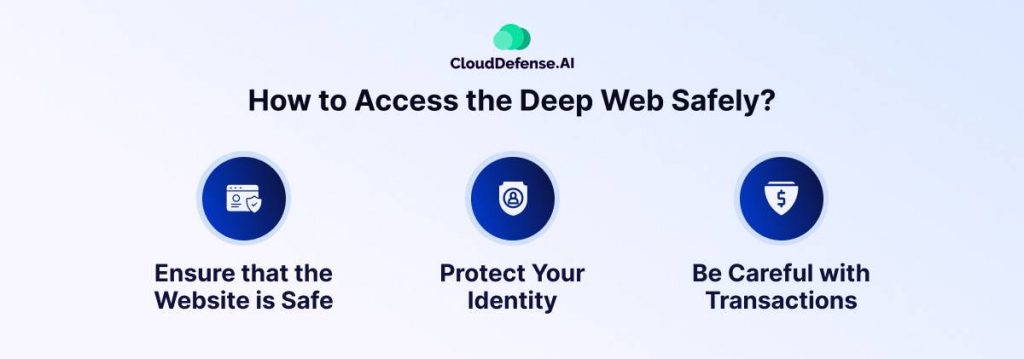
You generally access the deep web daily when you use your emailing services. In fact, 90% of all traffic on the net goes to and from the deep web. Surfing the deep web is just as safe as surfing the surface web.
However, If you have a legitimate reason to surf the deep web for other reasons, such as for privacy, security, or research purposes, here are some general guidelines to help you do so safely:
- Ensure the Website is Safe: Check that the website you will be visiting is safe by verifying its HTTPS connection and checking for a padlock in the address bar. Avoid suspicious links and research the site’s reputation before visiting it.
- Protect Your Identity: Use the same precautions as any other online activity. Be cautious about revealing personal information, and avoid using accounts that can be traced back to your real identity.
- Be Careful with Transactions: Only use known networks to make payments to deep websites. Avoid unsecured public networks, and be aware of potential risks associated with the networks you use.
Understanding Dark Web
The dark web is a secretive subset of the deep web.
What is the Dark Web?
The dark web is a covert and encrypted corner of the deep web, intentionally hidden from conventional search engines. The dark web, accessed through specialized tools like Tor, enables users to maintain anonymity and privacy. While not entirely illegal, it has gained notoriety for hosting illicit activities, including the sale of drugs, hacking services, and stolen data.
Its encrypted nature promotes privacy, attracting individuals with legitimate concerns about surveillance or censorship. However, this anonymity also promotes criminal enterprises. Law enforcement agencies globally monitor the dark web for illegal activities. Recognising that the dark web is just a small fraction of the broader deep web, which contains all unindexed online content, is crucial to understanding how both concepts differ.
Applications of Dark Web
The dark web is notorious for facilitating a range of illegal activities. It serves as a marketplace for illicit goods and services, including the sale of drugs, weapons, stolen data, and hacking tools. Criminal enterprises exploit its anonymity to conduct financial fraud, human trafficking, and other nefarious activities.
It also provides a platform for cybercriminals to exchange information, plan attacks, and sell compromised credentials. Law enforcement agencies worldwide actively monitor and combat these illegal activities on the dark web to maintain cyber and public safety.
Despite its association with illicit activities, the dark web serves various legitimate purposes. One notable application is the preservation of privacy and freedom of expression. Individuals living under oppressive regimes or facing censorship use the dark web to communicate and share information without fear of surveillance.
Whistleblowers and journalists seeking secure channels for sensitive information also prefer its encrypted platforms. Additionally, the dark web hosts forums and communities dedicated to cybersecurity and digital rights advocacy, allowing discussions on online privacy tools and strategies.
Furthermore, the dark web has practical applications in security research and testing. Cybersecurity professionals use it to understand evolving threats, vulnerabilities, and the latest hacking techniques in a controlled environment.
How to Access the Dark Web Safely
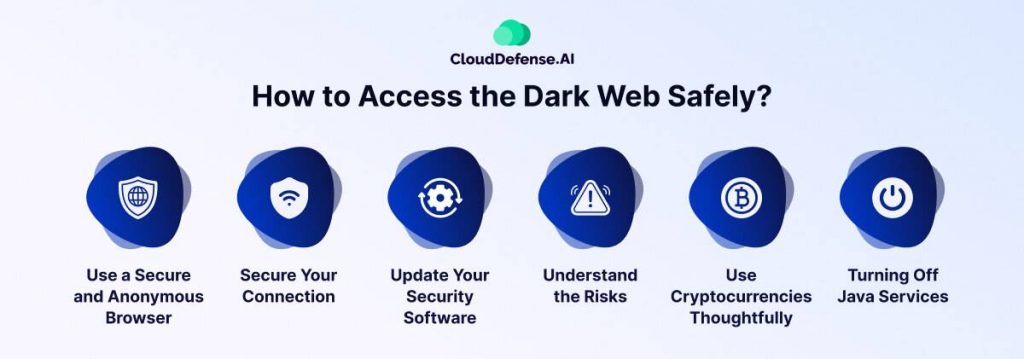
Accessing the dark web carries inherent risks due to its association with illegal activities and potential security threats. If you choose to explore it, follow these general guidelines to enhance safety:
- Use a Secure and Anonymous Browser: Use a privacy-focused browser like Tor (The Onion Router) to access the dark web. Tor anonymizes your online activities by bouncing your connection through a network of volunteer-operated servers.
- Secure Your Connection: Enable a VPN (Virtual Private Network) to add an extra layer of security. This helps mask your IP address and enhances privacy by disallowing hackers to know your location.
- Update Your Security Software: Keep your antivirus and anti-malware software updated to protect against potential threats.
- Understand the Risks: Be aware that illegal content and activities are on the dark web. Exercise caution, and never engage in illegal activities yourself.
- Use Cryptocurrencies Thoughtfully: If making transactions, use cryptocurrencies like Bitcoin for added anonymity. Be cautious of scams and fraudulent schemes.
- Turning Off Java Services: Disabling Java services is advisable to mitigate security risks when accessing the dark web. Malicious actors can exploit Java vulnerabilities, and turning off these services enhances user safety.
Types of threats On the Dark Web:
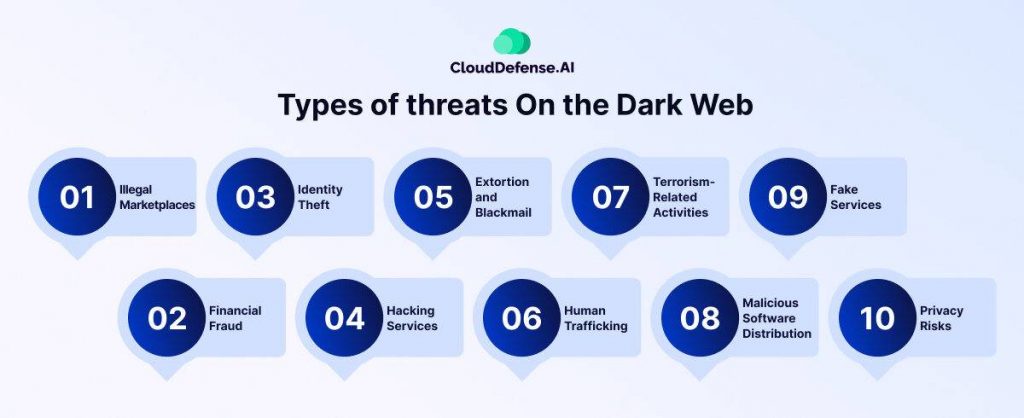
The dark web poses various threats, and users should be aware of the potential risks before they venture into this restricted part of the internet. Some common types of threats on the dark web include
- Illegal Marketplaces.
- Financial Fraud
- Identity Theft
- Hacking Services
- Extortion and Blackmail
- Human Trafficking
- Terrorism-Related Activities
- Malicious Software Distribution
- Fake Services.
- Privacy Risks.
Deep Web vs Dark Web: Key differences:
Here are some key differences between the concepts of the deep web vs dark web.
| Deep Web | Dark Web | |
| Accessibility | It can be accessed with a traditional deep web browser. Deep websites are normally not indexed in generic browsers like Google and Bing. | It is a part of the Deep web and can only be accessed using specialised browsers such as the Tor browser. |
| Scope of Content | Mainly contains legal content that includes private databases, emailing services, confidential information, and subscription content protected from public view. | Contains both legal and illegal content, such as the sale of drugs, hacking services, and other illicit transactions. |
| Intended Use | Used for added protection of content from the public as it only allows select individuals to access the sites. | Maintaining anonymity is used for carrying out both legitimate and illegitimate activities on the internet. |
| Accessing the Websites | It can be accessed with a standard browser if the links are available. | Requires special browsers to access the links. Links are encrypted and cannot be accessed through generic browsers. |
| Anonymity | Anonymity is not a priority here. | Highly anonymous, allowing users to interact without revealing their private information. |
FAQ
Is the Deep Web Safer Than the Dark Web?
The deep web is generally safer than the dark web. The deep web consists of legal and private content, while the dark web is associated with illegal activities. However, it is best to apply caution while surfing the deep web due to potential privacy concerns and exposure of sensitive information.
How Do You Get To the Deep Web?
Accessing the deep web is simple; it involves using standard web browsers to explore unindexed content like private databases and subscription services. Unlike the dark web, specific tools or permissions are not required to access the deep web.
Are The Dark Web and the Deep Web Illegal?
No, the dark web and the deep web are not illegal. The deep web includes all legal unindexed content, ranging from private databases to subscription services. While often associated with illegal activities, the dark web hosts legitimate, privacy-focused content. Engaging in illegal activities makes actions on these parts of the internet illegal, not the platforms themselves.
What Are the Best Browsers for the Deep Web and the Dark Web?
The Tor Browser is the most commonly recommended dark web browser for accessing the deep web vs dark web due to its strong focus on privacy and anonymity. When appropriately configured, other privacy-centric browsers like Brave and Firefox can also be used to access these internet parts.
Conclusion
It is high time that we understand the differences between the various layers of the internet. The deep and dark web is a trendy part of the internet; you must know each concept before entering it.
The deep web is like a hidden library containing legitimate content, while the dark web is a secret part where legal and illegal things happen. Understanding these webs helps you stay safe on the internet and be more aware of what you are accessing. Be careful and think about what’s right when you explore these parts of the internet.
We hope this guide helps you learn more about “Deep web vs Dark web”, make more intelligent choices online, and inform you about the different sides of the internet.

